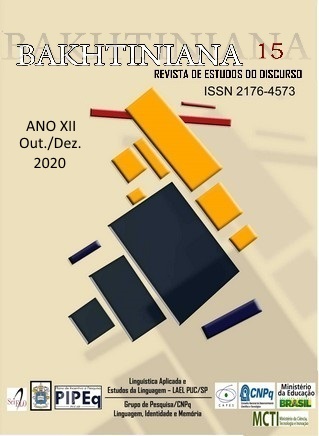The Clinking of Christ’s, Chico/Gil’s and Criolo’s Cups: The Issue of Ethics in a Dialogic Toast
Palabras clave:
Semantic sector of existence, Memory, Concrete utterance, Ethical act, Ideological signResumen
In this paper, the aim is to demonstrate the ethical-semantic impact of great time in the reaccentuation of two reformulations of the expression “let this cup pass from me.” Theoretically, we describe great time as semantic sectors of existence which frame the possibilities of meaning actualized in speech genres and concrete utterances. Methodologically, the song Cálice by Chico Buarque and Gilberto Gil and the RAP Cálice by Criolo are dialogically disposed in relation to their context of production, to one another and to the biblical narratives Jesus in the Garden of Gethsemane and The Last Supper, which simultaneously convey status of utterance to the expression of which cup configures a metonym and fix the expression as an item of a cultural memory that we can now name Roman Catholic memory.[1] The discussion shows that the transposition of this utterance from one semantic sector of existence to another alters the reflection and refraction processes of ideological signs through a game of memories.
[1] In this paper, references are made to biblical excerpts as components of the repertoire of the cultural memory specially linked to the Roman Catholic Church, because of its value and function in the Portuguese colonization of Brazil, since de 16th century, which was decisive for the constitution of the sense of Brazility. However, specially from de 19th century, with the organization of Protestant institutions in Brazil, these excerpts started to echo other trends of Christianity as well, so that this cultural memory could be broadly labled as “biblical memory.” As the history of Christianity in Brazil exceeds the scope of this paper, this note is registered, even though the mention to a Roman Catholic memory is kept.
Descargas
Publicado
Cómo citar
Número
Sección
Licencia
Los autores le conceden a la revista todos los derechos autorales referentes a los trabajos publicados. Los conceptos emitidos en los artículos firmados son de absoluta y exclusiva responsabilidad de sus autores.








